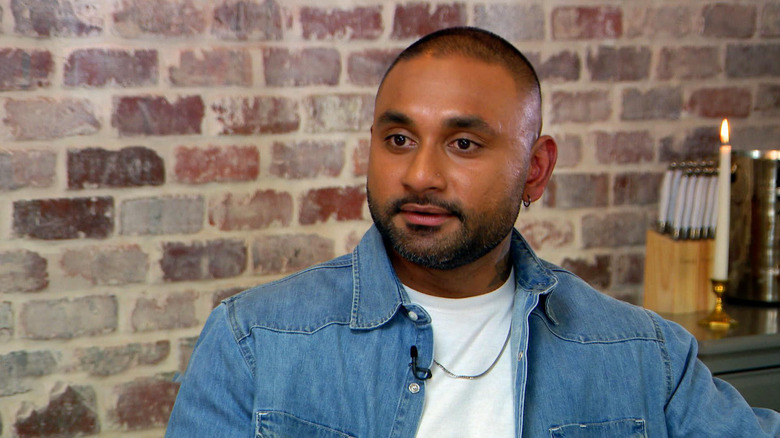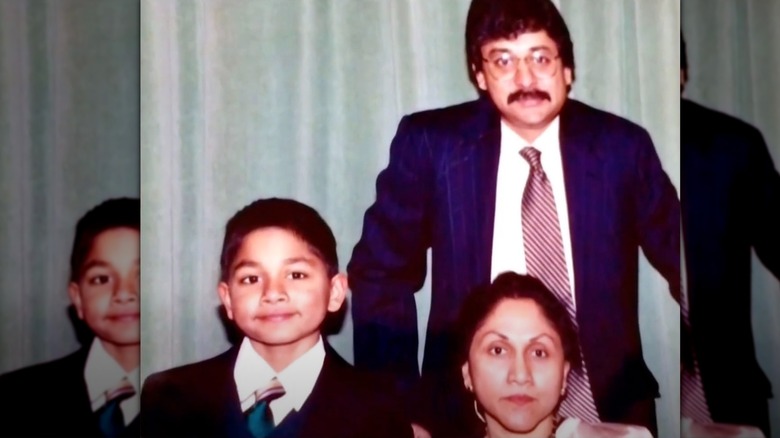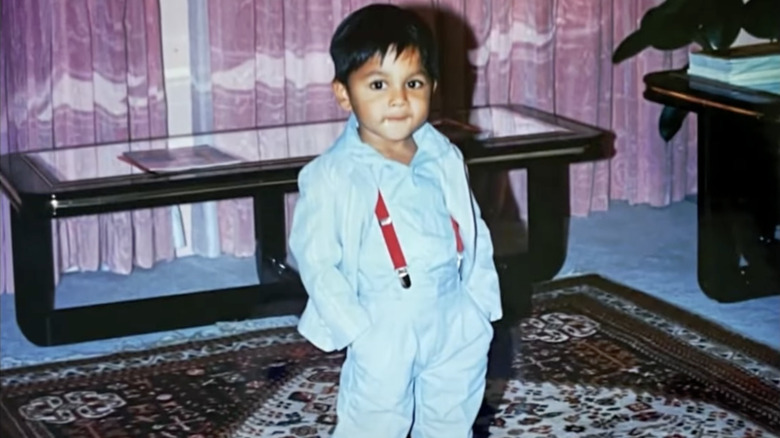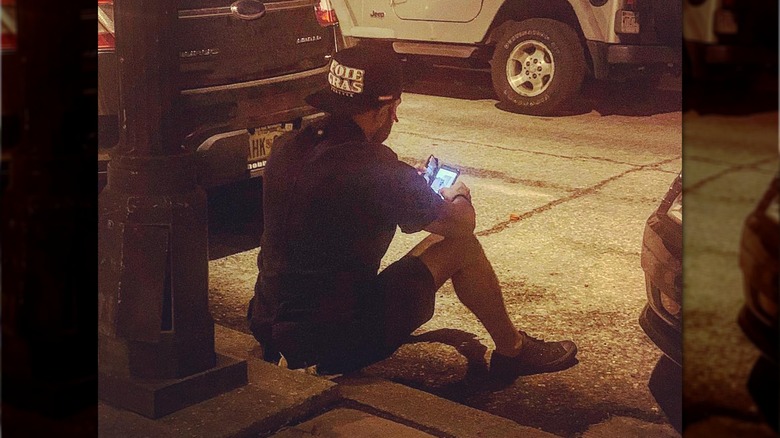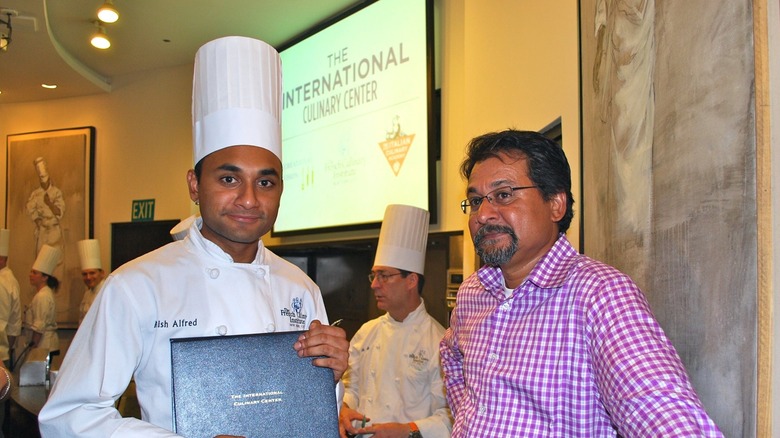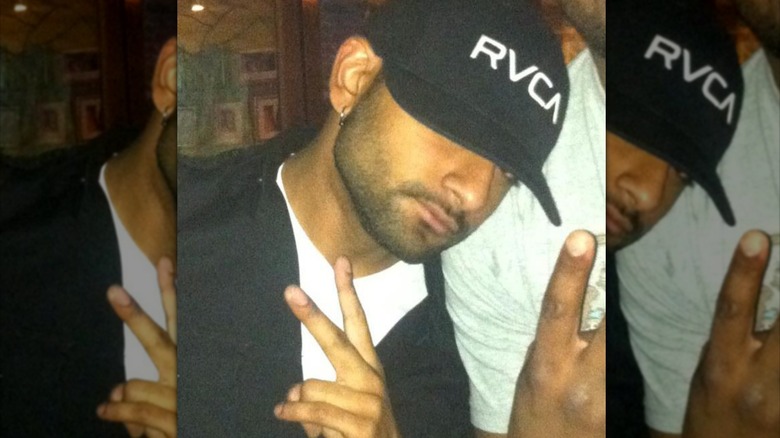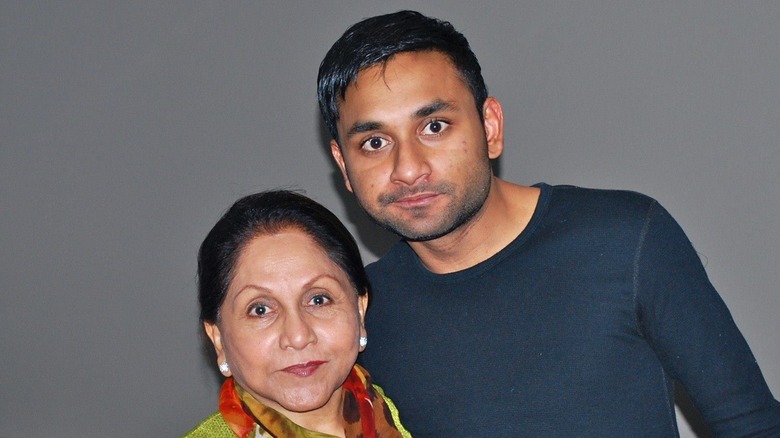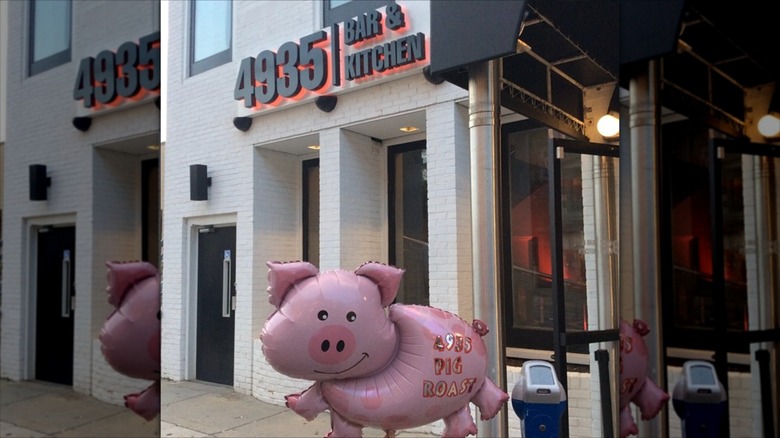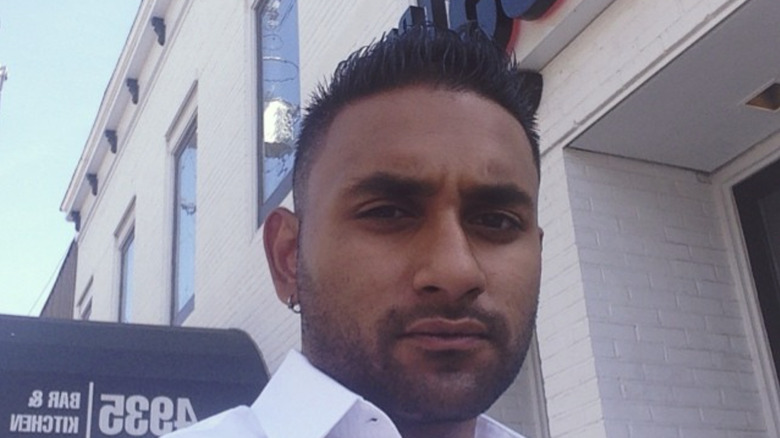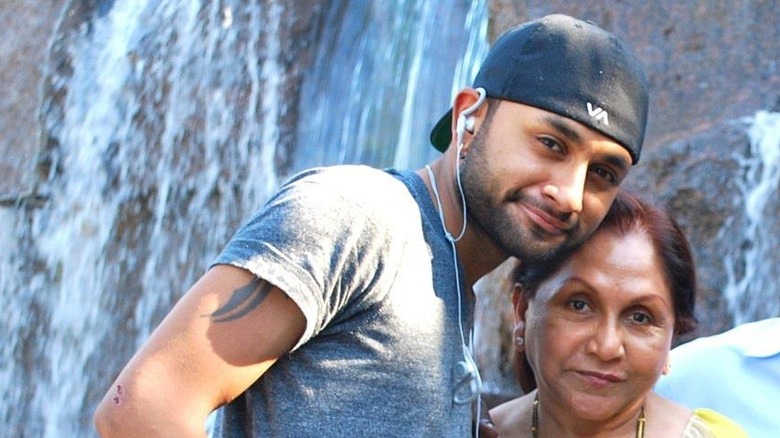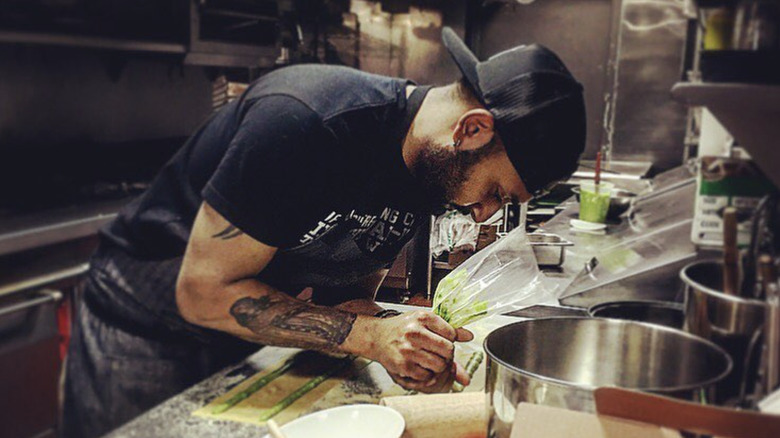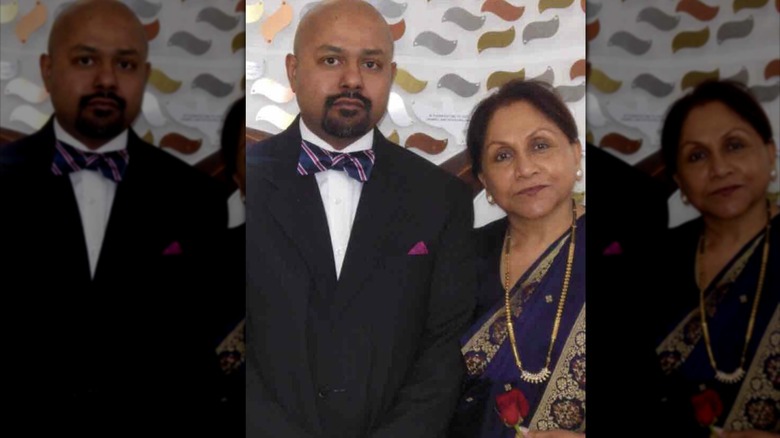Tragic Details About Ashish Alfred
Chef Ashish Alfred is a newer name in the celebrity chef enclave, but it took a lot to get here. Before he was tapped to appear as a guest host of Season 9 of "Bar Rescue", which premiered on February 25, 2024, Alfred built his reputation in the Baltimore and Washington, D.C. area as executive chef and owner of renowned French bistro Duck Duck Goose. He also owns Baltimore's Osteria Pirata and Anchor Bar. Yet the success of Alfred's restaurant group would never have been possible had he not overcome some enormous hurdles in life.
Today, chef Alfred has a decade of sobriety under his belt, though his journey to recovery is peppered with struggles that stem beyond substance abuse. His challenging childhood, plagued by insecurity, mental health issues, and family struggles, was momentarily eclipsed by Alfred's spark for the culinary arts. He began his career as a young chef full of promise, but his dark days were far from over.
Alfred spent years weathering trials and tribulations but never gave up completely. In the chef's own words, "Failure will be a part of your story ... The only wrong thing that you can do is to sit with that failure." By putting this message into practice, Alfred survived and thrived. Like some other chefs with tragic backgrounds, he is open about his experiences in hopes of reaching those still grappling with the very issues that nearly claimed his life. These are the tragic details about Ashish Alfred.
His mother's immigration to America was fraught
Ashish Alfred was born into a family that had already endured tremendous hardship. Alfred's mother Veena worked as a professor in Pune, a large city in western India. Veena came from a comfortable background, yet behind closed doors, the mother of two felt trapped in an abusive marriage. She began an affair with Rajish Alfred, a university student who was also her third cousin. It was the early 1980s, and India's restrictive culture meant that divorce was highly frowned upon. Veena divorced her husband anyway and thwarted judgment from her family and traditional Indian values by immigrating to the United States with her two young sons. Alfred planned to obtain a visa and join them later.
In Silver Spring, Maryland, Veena struggled to secure a long-term visa and worked multiple jobs to support her children. When Rajish arrived two years later, the couple married and bought a home together. In 1986, they had a son, Ashish. Unfortunately, Rajish had developed a serious drinking problem while he and Veena were apart. By the time he reached America and became a father, he was deep in the throes of alcoholism. Meanwhile, Veena continued to work around the clock to support her family. These were the tense and delicate circumstances under which young Ashish Alfred entered the world.
His father's alcoholism wreaked havoc on the family
Rajish Alfred tried to hide his alcohol addiction from his family when he first arrived in the U.S., but this quickly became impossible. At age two, Ashish Alfred spent months in a body cast after innocently leaping on his napping father's chest. Hungover and irritable, Rajish grabbed his son and pushed him to the ground, shattering his femur. Alfred did not learn the truth about his injury until he was a teen. "I haven't even begun to think about how I can ask forgiveness for this," Alfred's father told The Washington Post in 2019.
The whole family's livelihood and safety were often at the mercy of the elder Alfred's dangerous, unpredictable behavior. He ruined a car in one of many drunk-driving incidents, racking up three DUIs by 1989. In conversation with Baltimore Style, chef Alfred recalled being five and "eating New York strip and shrimp cocktail for breakfast," during a family stay at the Holiday Inn after his father "accidentally burned the house down."
Seeking refuge in a hotel wasn't always an option, however. At times, Rajish Alfred's behavior was so violent that his wife would flee to a shelter with her three boys in tow. By elementary school, Alfred had witnessed enough domestic disturbances to know that calling 911 was one way to stop his father from abusing his mother.
As a child, he was bullied
Alfred became well-versed in tiptoeing around his father's alcohol-induced volatility, and life at school wasn't any better. "I was the only brown kid around," Alfred explained in the Powerful One podcast. His skin and smaller stature made him a target for bullies. "To be a seven, eight, nine, 10, 11-year-old kid and not have any peace? Like, you're not at peace when you're at home, you're not at peace when you're at school," said Alfred, noting "not even as a child [was I] able to articulate that."
What was difficult to articulate metastasized into tremendous insecurity. Like so many first-generation Americans — especially those of color — Alfred, a suburban kid with Asian-immigrant parents, grappled with a muddled sense of identity. "At home you're Indian, and then you go to school and you're expected to be you, know, a red-blooded American," he said. "Those two juxtaposing forces on a child ... it can really put you in limbo like you know, where do I belong?"
That wasn't all. In adulthood, to heal from his rocky past, Alfred had to come to terms with being sexually assaulted between the ages of five and seven, by workers coming in and out of his first home in Silver Spring, Maryland. "They got handsy," Alfred told The Washington Post. "I knew as a child that it was a secret not to be told. I don't think it went too far. No, not too far."
Alfred turned to substances in his early teens
Speaking to the Powerful One podcast, Alfred said that being bullied "made me a super violent teenager ... I felt like I was constantly in a situation where, like, I had to prove who I was and what I was about to everybody that I came across. Which is a painful place to be."
In eighth grade, Alfred found that drinking and smoking marijuana dialed down his despair and made him popular amongst rebellious peers. With his mother hard at work building a senior care facility business and his father largely out of the picture (his parents divorced in 2001 and remarried in 2006), Alfred had little guidance. He befriended kids whose reputations were built on cutting school and partying. Summing up his wayward adolescence to Baltimore magazine, Alfred said, "I figured out pretty quickly that that was a little bit of a family for me."
After high school, Alfred worked various service industry jobs while nursing addictions to cocaine, pills, and alcohol. He recounted his state of mind to Baltimore magazine: "Cocaine provided a sense of euphoria. It made it easier to consume more alcohol and take more Percocet — it was a numbing mission for me."
Alfred excelled in culinary school, but his demons came along for the ride
"Nothing really changed for me until I found cooking," Alfred stated on the Powerful One podcast. Inspired by the rock and roll lifestyle Anthony Bourdain portrayed in his book "Kitchen Confidential" and the hours he spent watching Food Network cooking shows, Alfred concluded that being a chef was the only career that made sense for him. Getting his mother's blessing, however, took convincing. To sway her, Alfred cooked an elaborate Thanksgiving meal using downloaded recipes from, as he said, "Giada, Bobby Flay, whoever you can think of."
It worked. Alfred set off to train at New York City's French Culinary Institute with his mother paying tuition and board. Yet his addictions threatened the experience. During cocaine binges, Alfred often missed class, sometimes winding up back in Maryland when he was supposed to be in New York. Yet when he was focused, he flourished under the Institute's structure.
To Powerful One he said, "I needed a specific set of rules ... it was the first time in my life that I felt something was doable by me. It didn't matter how I looked, it didn't matter that I was smaller than everybody else, it didn't matter, like, where I came from ... I was only accountable to me and I only had to be better than the guy on my left and the guy on my right."
Addictions to alcohol and cocaine led him to use heroin
Although Alfred was faster and more neat than many of his fellow culinary students, he proved far too unreliable to be considered a respected chef. After graduating from the French Culinary Institute, Alfred worked stints at esteemed New York restaurants like Bar Pitti, Daniel, and Lupa, while moonlighting as a drug dealer. He disappeared for days at a time and lost one job after another. Alfred entered culinary school with the dream of becoming not just another cook, but a master chef. Under the thumb of addiction, he was incapable of fulfilling that ambition.
In 2012, he returned to Maryland, armed with classical culinary training and crumbling under the magnitude of his alcohol and drug dependency. His mother Veena had long been concerned over her son's heavy drinking, but what she didn't know was that he had escalated to using heroin. Alfred's early experiences with heroin were partially motivated by its ability to dull the effects of his rampant cocaine habit.
As he revealed to The Washington Post, "If it wasn't dope, it was [oxycodone] — whatever I could get my hands on. I was doing so much blow, the oxy would even me out, people said. And it worked." And yet there was an even darker undertone to Alfred's lure to heroin. "I liked the idea that I could die from it," he says. "That seemed like a comfortable death."
He grappled with suicidal ideation
Cocaine, alcohol, and pills had been in the picture for years, but by his mid-20s Alfred was also in the grips of heroin addiction. It was a situation that threatened his life in more ways than one. In conversation with the Powerful One podcast, Alfred explained that thoughts of self-harm were frequent. "Suicide was a constant in my life. It didn't matter. I welcomed that idea," he said. "My mother would ask me do you pray, and in the back of my mind I'd be telling myself, yeah I pray, I pray that god helps me overdose this time."
Alfred had overcome much adversity in his youth and had the skillset to be a successful working chef, yet he was on the verge of ending it all. With his drug use spiraling out of control, people began to distance themselves from him, both professionally and personally. Reflecting on his state of mind during this particularly dark point in his life Alfred told TODAY, "Why stick around? I was failing everyone around me. I had lost the respect of anybody close to me. The one person I really did care about, my mother, at one point, she couldn't stand the sight of me."
His first restaurant failed
In 2012, Alfred left New York and returned home to Maryland, convinced he could open a restaurant of his own. Though he was heavily addicted to alcohol and drugs and reliant on his mother's money, Alfred managed to open 4935 Bar & Kitchen in Bethesda. On the Heart of the Matter podcast, he describes the early days of 4935 as a mess. "My mother had no idea what she was getting into. The people that were working there with me were just kind of there to party with me. I hired a bunch of my friends. It was miserable, and I was failing miserably."
Unlike its owner, 4935 Bar and Kitchen didn't evolve, remaining more of a party spot in the upstairs event space than an expression of Alfred's culinary expertise. This changed in 2017 when Alfred closed 4935 for renovations and reopened the restaurant that fall. The updated look came with a new name: George's Chophouse, in honor of his older brother who was more like a surrogate father to him.
Then, when COVID-19 hit, George's Chophouse folded, closing its doors in May 2020. Making a public statement, Alfred stood in front of the restaurant and said, "I'm grateful for the opportunity I was given. Bethesda's been really patient with me while I learned here" (via MoCo360).
He stole from his family and looted his own restaurant
Alfred was just a young man when he became a full-blown addict and wasn't above stealing to fund his cocaine habit — even taking advantage of his family members. In an interview with the Heart of the Matter podcast, Alfred stated, "I remember as a 21-year-old guy, stealing money out of my mother's purse, so I could go buy coke. I remember pawning her watch, pawning my father's jewelry, or a thrill that I couldn't even tell you about today. It was that insignificant."
When the troubled chef got hooked on heroin, the need for cash was constant. Despite his lack of experience and the destruction substance abuse was causing in his life, Alfred opened his first restaurant, 4935 Bar & Kitchen, when he was 25. His mother financed the project and l, as Alfred pointed out on the Powerful One podcast, tried to prevent him from single-handedly destroying it. "The keys had been taken away from me because I'd stolen so much cash," he said.
In April 2014, after spending a night at home using drugs with a sex worker, Alfred took off on foot to 4935, intent on getting money to replenish their supply. Then, he nodded out and fell on the pavement, splitting open his chin and breaking several teeth. With blood dripping from his face, Alfred reached the restaurant, broke in, and took $4,000 from the safe.
By his late 20s, his mother nearly cut ties with him
He'd smashed his face on the sidewalk, spit out four of his teeth, and stolen four grand in cash from his restaurant. Yet, as he recalled it, all Alfred could think about on that spring morning in 2014 was getting high. On his way home from the robbery, he bought some super glue, and the drug-dealing sex worker from the night before was still in his apartment and helped him glue his chin shut. Eventually, he nodded off again, only to wake up and realize that the woman had left — with the rest of the cash.
Later that day, Ashish's mother Veena arrived not only to confront him about the theft but also to offer an ultimatum. "I said that you will go to a rehab or you will not see me again. I am not your mother, you are not my son," she told TODAY.
Alfred valued his bond with his mother above any other relationship in his life, but he continued to abuse drugs for another week or so before accepting her help. On April 12, 2014, Veena Alfred took her son on a silent drive to the Caron Treatment Center in Pennsylvania. What he assumed would be a three-day stint in detox was a 28-day rehabilitation program. Alfred was reluctant to stay at first but completed treatment. He has been sober ever since.
After rehab, Alfred still struggled with sobriety
Without alcohol and drugs, Alfred was finally able to think and feel clearly. He told the Powerful One podcast that it was in rehab that he laughed uncontrollably for the first time. "It stopped me dead in my tracks. And I was like man, I gotta keep this going ... I just felt warm and comfortable for the first time in that feeling and in my own skin."
But Alfred continued to battle his ego, anger, and insecurities. He returned to work at 4935 Bar and Kitchen the same day he left rehab. Two weeks later, sensing that he was on the brink of relapsing, Alfred re-entered treatment for an additional seven days. Upon returning to the outside world, Alfred was committed to rebuilding trust with the people in his personal and professional life, yet he had trouble keeping 4935 staffed because people were nervous about working under him. Knowing he had a lot to prove, he allowed employees to randomly drug test him multiple times a week, a policy he upheld for years.
By 2016, Alfred had rebuilt his culinary reputation to a point where he was ready for a new venture: Duck Duck Goose, a small French bistro with a fusion twist. It has been his most successful restaurant to date. Drawing from these experiences has made Alfred a strong advocate for creating service industry environments that aren't centered around partying.
In 2015, his older brother died
Alfred is no stranger to tragic circumstances, but when his brother Dhiraj "George" Waidande died unexpectedly of a heart attack in 2015, the loss hit the family hard. Waidande was 39 years old.
As a boy, Alfred remembers his big brother teaching him the importance of not wasting food and making sure he always finished his dinner. Alfred continues to implement this no-waste ethos in his professional kitchens, where he is known to craft small plates from vegetable trimmings rather than toss them out. When Alfred rebranded his flagship restaurant 4935 Bar and Kitchen as George's Chophouse in November 2017, the tribute to his brother ran deeper than the name.
Driven by the concept of an affordable steakhouse, Alfred put moderately-priced, home-style entrees on the menu. One such dish was spaghetti and meatballs with homemade pasta, which Alfred specifically crafted in his brother's memory. "My brother cooked for me a lot and it was easy to make me spaghetti and meatballs. The meatballs were definitely not from scratch and sauce definitely came out of a jar, but the meal itself is something I associate with him," Alfred told The Washingtonian. George's Chophouse is now closed, but Alfred will always carry his brother's legacy with him. Tattooed on his hand is a scroll displaying the years of Waidande's birth and death, along with a bird flying across the sun.
If you or anyone you know needs help with addiction issues, may be the victim of child abuse, or is struggling or in crisis, contact the relevant resources below:
- Visit the Substance Abuse and Mental Health Services Administration website or contact SAMHSA's National Helpline at 1-800-662-HELP (4357).
- Contact the Childhelp National Child Abuse Hotline at 1-800-4-A-Child (1-800-422-4453) or contact their live chat services.
- Call or text 988 or chat 988lifeline.org
